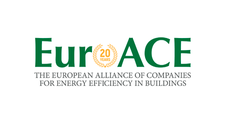Search eceee proceedings
eceee 2019 Summer Study on energy efficiency: Is efficient sufficient?
Panel 7. Make buildings policies great again
Panel leaders: Sibylle Braungardt & Andreas Hermelink
Estimating the sufficiency potential in buildings: the space between under-dimensioned and oversized
This is a peer-reviewed paper.
Anja Bierwirth, Wuppertal Institut for Climate Environment and Energy, Germany
Stefan Thomas, Wuppertal Institute for Climate, Environment and Energy, Germany
Built environment as mediator of good (or bad) household practices: moving towards sufficiency in middle-class houses in Pakistan
This is a peer-reviewed paper.
Rihab Khalid, University of Cambridge, United Kingdom
Minna Sunikka-Blank, University of Cambridge, United Kingdom
How earthquakes shook up Dutch energy policy: an overview on who should do what, when and how to renovate 99% of all Dutch houses in the next 30 years
This is a peer-reviewed paper.
Casper Tigchelaar, ECN part of TNO - Energy Transtion Studies, The Netherlands
Renee Kooger, ECN part of TNO, The Netherlands
Margriet van Lidth de Jeude, ECN part of TNO, The Netherlands
Nicole de Koning, ECN part of TNO, The Netherlands
Robin Niessink, ECN part of TNO, The Netherlands
Geerte Paradies, ECN part of TNO, The Netherlands
The influence of intermediaries’ advice on energy-efficient retrofit decisions in private households
This is a peer-reviewed paper.
Katrin Arning, RWTH Aachen University, Germany
Barbara Sophie Zaunbrecher, RWTH Aachen University, Germany
Martina Ziefle, RWTH Aachen University, Germany
Approach to an unknown: representative sample survey to explore the non-residential building stock in Germany – methods and first results
This is a non-peer reviewed extended abstract. No paper available.
Michael Hörner, Institut for Housing and Environment (IWU), Germany
Dr. Holger Cischinsky, Institute for Housing and Environment (IWU), Germany
Prof. Dr. Guido Spars, Bergische Universität Wuppertal, Fachbereich Architektur, Fachgebiet Ökonomie des Planens und Bauens, Germany
Dr. Roland Busch, Bergische Universität Wuppertal, Fachbereich Architektur, Fachgebiet Ökonomie des Planens und Bauens, Germany
Dr. Martin Behnisch, Leibniz Institute of Ecological Urban and Regional Development (IÖR), Germany
Evaluating the renewable heating and efficiency obligation for existing buildings – insights into the mechanisms of mandatory building requirements
This is a peer-reviewed paper.
Martin Pehnt, Ifeu – Institute for Energy and Environmental Research Heidelberg, Germany
Uta Weiß, ifeu, Germany
Sara Fritz, ifeu, Germany
Dominik Jessing, ifeu, Germany
Veit Bürger, Öko-Institut, Germany
Tanja Kenkmann, Öko-Institut, Germany
Klaus Lambrecht, ECONSULT Lambrecht Jungmann Partnerschaft, Germany
Jan Steinbach, IREES, Germany
Mapping energy poverty in the EU: policies, metrics and data
This is a peer-reviewed paper.
Faidra Filippidou, European Commission, Joint Research Centre (JRC) Petten, The Netherlands
Maria Kottari, European Commission, Joint Research Centre (JRC), The Netherlands
Savvas Politis, European Commission, Joint Research Centre (JRC), The Netherlands
Christiana Papapostolou, Centre of Technological Research of Piraeus and Islands (CTR), University of West Attica, Greece
The influence of uncertainties related to the inputs of the French EPC’s calculation method – an analysis for individual houses
This is a peer-reviewed paper.
Maxime RAYNAUD
Dominique Osso, EDF R&D, France
Tony Schnell, Ecole Centrale de Nantes, France
Arthur Rolland, EDF R&D, France
Is an assessment framework for energy efficient buildings hiding in plain sight?
This is a peer-reviewed paper.
Sally Semple, Heriot Watt University, United Kingdom
David Jenkins, Heriot Watt University, United Kingdom
Put the pedal to the metal – how policies can accelerate the diffusion of energy-efficient building technologies
This is a peer-reviewed paper.
Marius Schwarz, ETH Zurich, Switzerland
Christof Knoeri, ETH Zurich
Indian luxury homes: revising the energy conservation building code to address energy sufficiency and re-bound effect
This is a non-peer reviewed extended abstract. No paper available.
Vivek Gilani, cBalance Solutions Hub, India
Philippe DeRougemont, NOE21, Switzerland
Dhrumit Parikh, cBalance Solutions, India
Prachi Bhujbal, cBalance Solutions, India
Hasan Banna Khan, cBalance Solutions, India
Matouleibi Chingsubam, cBalance Solutions, India
Indoor environmental quality as a mean to catalyse the acceptance and implementation of the major new EPBD provisions
This is a peer-reviewed paper.
Vivian Dorizas, BPIE, Belgium
Maarten De-Groote, BPIE
Jonathan Volt, BPIE
Reduction of living space consumption as necessity for reaching energy targets – potentials, barriers, policies
This is a peer-reviewed paper.
Tanja Kenkmann, Öko-Institut (Institute for Applied Ecology), Germany
Johanna Cludius, Öko-Institut e.V., Germany
Schumacher Katja, Öko-Institut e.V., Germany
The time dimension in deep renovation: evidence and analysis from across the EU
This is a peer-reviewed paper.
Tina Fawcett, ECI-CREDS, University of Oxford - Environmental Change Institute, United Kingdom
Marina Topouzi, Univeristy of Oxford, United Kingdom
Minimum energy efficiency standards for rental buildings in Germany – untapping health benefits
This is a peer-reviewed paper.
Sibyl Steuwer, BPIE, Germany
Andreas Jahn, The Regulatory Assistance Project, Germany
Jan Rosenow, The Regulatory Assistance Project, Belgium
Green leasing in Sweden – the case of the Swedish Energy Agency
This is a non-peer reviewed extended abstract. No paper available.
Mehmet Börühan Bulut, Swedish Energy Agency, Sweden
Veronica Eade, Swedish Energy Agency, Sweden
Sea Rotmann, SEA – Sustainable Energy Advice Ltd, New Zealand
Kathryn Janda, University College London, United Kingdom
Energy decisions in heating consumption. Results from fuzzy cognitive maps
ELENA LOPEZ BERNABE, Basque Centre for Climate Change (BC3), Spain
Ibon Galarraga Gallastegui, Basque Center for Climate Change, Spain
Bridging the gap: integrating energy measures into mainstream home repairs, maintenance and improvements
This is a peer-reviewed paper.
Catrin Maby, Cardiff University, United Kingdom
Planned staged deep renovations as the main driver for a decarbonised European building stock
This is a peer-reviewed paper.
Sara Fritz, ifeu, Germany
Martin Pehnt, ifeu
Peter Mellwig, ifeu
Jonathan Volt, BPIE
Industrialised renovation: learnings from European frontrunners
This is a non-peer reviewed extended abstract. No paper available.
Jonathan Volt, BPIE, Belgium
Sibyl Steuwer, Buildings Performance Institute Europe, Germany
Decoding India’s residential building stock characteristics to enable effective energy efficiency policies and programs
This is a peer-reviewed paper.
Sandeep Kachhawa, AEEE, India
Satish Kumar, Alliance for an Energy Efficient Economy, India
Mohini Singh, Alliance for an Energy Efficient Economy, India
The contribution of energy efficient glazing to Paris objective in different EU building renovation scenarios
This is a peer-reviewed paper.
Cédric Janssens, Glass for Europe / Research Associate at Public Law Center - Université Libre de Bruxelles (ULB), Belgium
Building renovation passports: an instrument to bridge the gap between building stock decarbonisation targets and real renovation processes
This is a peer-reviewed paper.
Iná Maia, TU Wien, Austria
Lukas Kranzl, TU Wien
How to finance the renovation of residential buildings: innovative financing instruments
This is a peer-reviewed paper.
Paolo Bertoldi, European Commission, Joint Research Centre (JRC) Ispra, Italy
Benigna Boza-Kiss, Central European University, Hungary
marina economidou, EC JRC, Italy
Valentina Palermo, EC JRC, Italy
Energy efficiency as a catapult to zero carbon buildings: raising city ambition through the Building Efficiency Accelerator
This is a peer-reviewed paper.
Debbie Weyl, World Resources Institute, USA
Victoria Burrows, World Green Building Council, United Kingdom
Getting to the top floor: towards policy options to address the energy saving potentials of lifts
This is a peer-reviewed paper.
Simon Hirzel, Fraunhofer ISI, Germany
Antoine Durand, Fraunhofer Institute for Systems and Innovation Research ISI
João Fong, ISR – University of Coimbra, Dep. of Electrical Engineering, Polo II, Portugal
Clemens Rohde, Fraunhofer Institute for Systems and Innovation Research ISI, Germany
Mahsa Bagheri, Fraunhofer Institute for Systems and Innovation Research ISI, Germany
Deep retrofit approaches: managing risks to minimise the energy performance gap
This is a peer-reviewed paper.
Marina Topouzi, ECI-CREDS, University of Oxford - Environmental Change Institute, United Kingdom
Alice Owen, University of Leeds, United Kingdom
Gavin Killip, University of Oxford, United Kingdom
Tina Fawcett, Oxford University ECI, United Kingdom
Living spaces: saving energy by encouraging alternative housing options for senior homeowners
This is a peer-reviewed paper.
Corinna Fischer, Öko-Institut (Institute for Applied Ecology), Germany
Immanuel Stieß, Institut für sozial-ökologische Forschung, Germany
Social-environmental-economic trade-offs associated with carbon-tax revenue recycling
This is a peer-reviewed paper.
Louis-Gaëtan Giraudet, CIRED, France
Cyril Bourgeois, CIRED
Philippe Quirion, CIRED
EPC+: linking households to archetypes in retrofit decision-making support
Hui Ben, Department of Architecture, University of Cambridge, United Kingdom
Koen Steemers, University of Cambridge, United Kingdom
Panels of the eceee 2019 Summer Study
1. The dynamics of limiting (energy) consumption
2. What's next in energy policy?
4. Monitoring and evaluation for greater impact
5. Smart and sustainable communities
7. Make buildings policies great again
8. Buildings: technologies and systems beyond energy efficiency
9. Improving energy efficiency in ICT, appliances and products

























